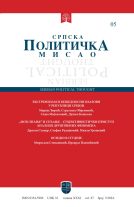- Home page
- Researchers
- Predrag Pavlićević
Predrag Pavlićević
National Security Academy, Belgrade

DETERMINANTS OF CORRUPTION IN THE GLOBAL FINANCIAL ORDER
In this article, we look into segments of the contemporary global financial order as a framework inherently supportive for corruptive behavior. By analysing secondary sources and normative instruments, we mark the financial operations and mechanisms that can support the realisation of the lucrative aspect of corruption, induce the risks for the development of corruption generated by various financial operations, and indicate the problem of the normative articulation of these risks in anti-corruption acts are. The goal of the work is to contribute to the effective normative suppression of this phenomenon, as a threat to national security. The presented findings provide a basis for the conclusion that the normative confrontation with corruption requires a critical approach to the legality of money circulating through operations in the financial order, and special control of the origin of capital at the level of the central bank.

Theoretical frameworks for constructing a model for analysis of Islamic discourse on YouTube: one view from Serbia
The starting point of this paper an assumption that videos on the YouTube Internet portal relating to Islam produce intolerant and radical discourse that may be a factor of radicalization through their contents, the ways of the shaping of the content, and by their presentation modes. Thus, the aim of the study is to present theoretical frameworks and possible research tools needed to construct a model for the analysis of the Islamic discourse on YouTube. This paper draws on various theoretical approaches, indicate a large number of potential analytical concepts, sub-models, instruments and criteria. It argues in favour of theoretical pluralism, as well as a pluralistic approach and models, openness to accepting diverse methodological instruments, and stresses the need of multidisciplinary in the analysis. Consideration of the relationship between the concepts of politics, discourse and Islamic discourse led to a conclusion about the need of a particular emphasis on the use of critical discourse analysis (CDA) and political discourse analysis (PDA) settings. The results of the research indicate that Islamic discourse on YouTube in a large number of videos, with more or less open manipulative content (visible to the average viewer), aims at consolidating an unquestionable framework of understanding and knowledge of reality – as well as comprehending of the history. Designing a framework for understanding reality and through associated eschatology, the rules of everyday action, principles and limits of tolerance, and identity – especially through discursive strategies and argumentation and beliefs that establish enemies – Islamic discourse on YouTube interprets reality, constructs and impose the only possible reality, and the necessity of achieving the ideal universal Islamic perfection.
